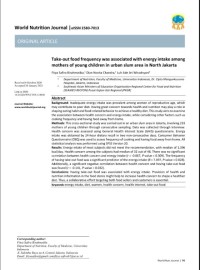Take-out food frequency was associated with energy intake among mothers of young children in urban slum area in North Jakarta

Author
Fitya Safira Birahmatika - Personal NameDian Novita Chandra - Personal Name
Luh Ade Ari Wiradnyani - Personal Name
Abstract:
Background: Inadequate energy intake was prevalent among women of reproductive age, which may contribute to poor diet. Having great concern towards health and nutrition may play a role in shaping eating habit and food-related behavior to achieve a healthy diet. This study aims to examine the association between health concern and energy intake, while considering other factors such as cooking frequency and having food away from home.Methods:This cross-sectional study was carried out in an urban slum area in Jakarta, involving 233 mothers of young children through consecutive sampling. Data was collected through interview. Health concern was assessed using General Health Interest Scale (GHIS) questionnaire. Energy intake was obtained by 24-hour dietary recall in two non-consecutive days. Consumer Behavior Questionnaire (CBQ) was used to assess frequency of cooking and having food away from home. All statistical analysis was performed using SPSS Version 20.Results: Energy intake of most subjects did not meet the recommendation, with median of 1,396 kcal/day. Health concern among the subjects had median of 32 out of 48. There was no significant correlation between health concern and energy intake (r = -0.067, P-value = 0.309). The frequency of having take-out food was a significant predictor of the energy intake (β= 7.497, P-value = 0.028). Additionally, a significant negative correlation between health concern and having take-out food was found (r = -0.141, P-value = 0.032).Conclusions:Having take-out food was associated with energy intake. Provision of health and nutrition information in the food stores might help to increase health concern to shape a healthier diet. Thus, a collaborative effort targeting both food sellers and customers is essential.
Detail Information
| Series Title | : | - |
| Call Number | : | - |
| Publisher | : | : World Nutrition Journal., 2021 |
| Collation | : | World Nutrition Journal, 2021 ( 70-79) |
| Language | : | English |
| ISBN/ISSN | : | 2580-7013 |
| Classification | : | NONE |
 Computer Science, Information & General Works
Computer Science, Information & General Works  Philosophy & Psychology
Philosophy & Psychology  Religion
Religion  Social Sciences
Social Sciences  Language
Language  Pure Science
Pure Science  Applied Sciences
Applied Sciences  Art & Recreation
Art & Recreation  Literature
Literature  History & Geography
History & Geography